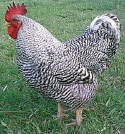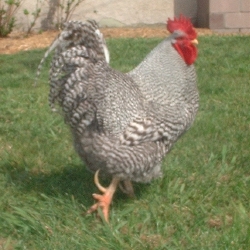HOME

~~~Throughout this site, simply hover your mouse over each picture for a pop-up caption to explain what or who it is.~~~
Roosters
ROOSTERS
Roosters are very entertaining, if loud. Baby chicks can start crowing as young as 2 months of age or less! They tend to start crowing at around
4:30AM, which does not thrill your neighbors. We have found that placing sheets
of wooden particle board on the outside of our coop at night keeps it dark
and helps to muffle and reduce the inevitable crowing.
Chickens have a strict 'pecking order' in which there is a Head Rooster and a Head Hen. Beneath them are the rest of the flock, in descending order of rank. The chickens decide among themselves who is top dog
and who is on the bottom rung of the ladder. If you have more than one rooster, there will be a Beta Roo and his Beta Hen. On the pecking order ladder they fall just after the Head Roo and Hen. The Head Roo and
Head Hen get first pick of food, nests and roosts, and can peck anyone they want and no one can peck them. And so on down the line. Youngsters and new adults added to the flock will be at the bottom of the
pecking order. Hens who mature and come into lay seem to elevate themselves up the ladder, and broody hens do likewise.
You need a rooster if you want fertile eggs to hatch. Hens will still lay
eggs with or without a roo, but I think having a roo completes the circle,
if you will. He is a benevolent god--father figure, protector and lover all
rolled into one. He should be just as kind to you and yours, especially children.
Life is too short to keep a mean rooster, if you get one that cannot be turned
towards good, get rid of him. Roosters have sharp claws and spurs and
can seriously injure a person in the blink of an eye, especially your children who are down at eye level--an attacking roo instinctively goes for the face and eyes of his opponent. Your roo should be friendly and you
should be able to come along and scoop him up, carry him around, hold him and pet him as often as you please. Croon to him softly and praise him when you do this, and when you do put him down, do so slowly
and with lingering strokes as he walks slowly away. Don't let him struggle out of your arms, only let him down once he is calm and sweet. Continue to praise him as he walks away and gives you confused looks and
makes embarrassed murmurings in his throat. This not only reinforces your place as Head Roo, it takes him down a peg or two and it keeps him used to being handled.
I have this link on the home page as well, but it's so great it bears repeating: A great page on Shilala's site on taming not only roosters but chickens in general
is here, well worth the read. This technique works, I use it all the time, both with new birds and when any bullying is going on:
http://shilala.homestead.com/roosters.html
You need to make it clear the YOU ARE THE HEAD ROO/HEN. Do not allow any bird to attack you, flog you or peck you in an aggressive way. This is different than your favorite hen coming over to tug on your pant
leg to say, 'Hey, I'm down here--pick me up!' There is no mistaking an attack. When this happens, you are being challenged. Respond immediately. Chickens are animals and understand instant cause and effect.
When a roo attacks you and beats you with his wings, spurs you or claws you while pecking, it's called 'flogging'. Don't EVER tolerate it! If the flock sees you take a tumble from the Head Roo position, it's a bad deal
all around. Birds who attack you should be chased around and made to run from you. Chase them just a little longer than you think necessary, while growling deep in your throat or saying 'No!'. You aren't out to hurt
him (do not EVER hit or kick an animal), just
embarrass him a bit. This makes the point, both to them and to other birds that are watching for how you will respond. Roosters are big on dignity. We help keep our two roos, Phoenix and Scott, balanced by
picking
Phoenix (the Head Roo) up once in a while and petting him while Scott looks on. If Scott (the Beta Roo) starts getting to big for his britches, we pick HIM up in front of Phoenix.
Be sensible when choosing a roo and opt for one of the breeds known to be docile and friendly--Buff Orpingtons, Barred Rocks, Cochins, etc. Generally the 'Heavy' breeds are gentler than the 'Jungle Fowl' type. The
'Jungle Fowl' type birds are the kind usually bred for cockfighting, and if you get that type of roo you are more apt to have a problem with aggression--they can't help it, having been bred that way by humans for a long
time now. A good rooster
will watch over his hens, keeping an eye out for predators and will usually
be the first to sound the alarm if he sees one--a loud growl which makes
the other birds freeze and stand up straight, looking around. Some hens may
growl and/or cackle sharply in answer to help sound the warning.

A good roo will forage for goodies and more often than not call the hens
over with an excited clucking when he finds something. He will hold the goodie
in his beak or hover over it, standing still and looking disgustedly contented, as the
hen eats it. He's almost in a trance. Sometimes he uses this opportunity to grab her by the back of
the neck and mate her, and sometimes he fakes finding something to lure a
hen his way for mating. Sometimes hens will fight off a rooster that is trying
to mate them, some submit. If a hen has a bald spot on the top and back of
her head (and sometimes on her back) she is being mated roughly and too often.
Any girl with her dance card this full needs some intervention by you--either
you have too many roos and too few hens or the roosters have a favorite girl.
Usually rooster have sharp spurs, and sometimes they can injure a hen during
mating. Keep an eye out for any puncture wounds on your girls.
Roosters have a peculiar "dance" that they perform for the hen of their choice.
They will drop one wing and drag the wingtip on the ground while skipping
on one foot around the hen in a circle while emitting a low chuckle. At our
house we call this the "Hey, baby!" Most hens know what this means and will
either flee or submit.
How many roosters should you have? Well, if you have the room and separate quarters, one roo for every 6-10 hens is a fine ratio, many breeders will have even fewer hens per roo. But breeders are careful about not
allowing their birds to all run together--that many roosters all together could be disasterous.
For my mixed backyard flock of standard size birds and banties, I keep one standard size roo and one banty roo. More than that causes problems in the form of fighting and bullying, which upsets the hens and the
flock dynamic. The Head Roo will have his harem of favorite hens that stick with him, the Beta Roo will have HIS harem of favorites, and there are a few hens that kind of orbit and move among both groups.
Sometimes roosters will cautiously greet each other (or you) with direct eye contact and a slow, languid flap or "wave" or their wings. The Lesser or Beta Roos wave first at the Head or Alpha Roo. This is a way of
saying, "Hi, I'm friendly and mean you no harm, please don't kick my butt!" Some hens will do this as well. If a hen is feeling especially perky, she'll stand on her tip toes and greet you with a faster flap of the wings,
but where the primary flight feathers actually make a 'clacking' sound as she whacks her wings together over her back. Kind of like a human clapping their hands
MY HEAD ROO IS BLOODY AND HIDING UNDER A BUSH!
Oh, dear. Sooner or later, as your Head Roo gets older and less able to fulfill his duties, any younger roo is going to start getting ideas. When he does, the former Head Roo's fall from power is shockingly swift,
violent and in most cases is for good. Sometimes the new Head Roo will suffer the old guy to stay on in the Beta Roo position (or he gets his butt kicked as every other roo you have takes his shot at him).
Sometimes the old fella is banished to a corner of the barnyard with his favorite hen or two. Sometimes you have a decision to make if the new Head Roo won't stop beating up on the old guy--keep the old fella on and
get rid of the bully, or keep the new Head Roo and either rehome your old man or set him up his own separate digs. Head Roos that have fallen from grace are generally easily frightened and timid.
We once had to bring our young and strong Head Roo, Phoenix in for a couple of weeks while an injured leg healed. While he was recuperating, Scott, our Beta Roo, thought the world was his and he'd moved up the
ladder. Well, much to his surprise, one day Phoenix was reintroduced to the flock. The hens had no problem, but Scot DID. Scott chased and fought with Phoenix, who fought him a bit (and was so big he sat on
Scott several times) but mostly ran, since in his mind HE was now the newcomer. We still wanted to keep both boys, and in an effort to get things back to the way they were, we confined Scott to the coop for about
a week while Phoenix had free range of the yard and the hens. We hated doing it, and needless to say, Scott was upset about this, but it did work and eventually we were able to merge everyone back into one flock.
Things are now as they used to be.
WHAT THE--? MY HEN IS CROWING!
Ah, the 'crowing' hen. Yes, it does happen. You are SURE she is a hen, you've seen her lay eggs! Still, she crows-- and people think you are nuts when you tell them about it. Rest easy, you aren't crazy. In the
old days a crowing hen was seen as a sign of ill luck and was killed outright. Sometimes, in the absence of a rooster, one of hens that is higher up in the
pecking order will begin to take on roosterly qualities--crowing, finding food and calling and even mating other hens! Some hens even grow tiny, rudimentary spurs, although we have some hens that have little spurs
that never otherwise act like roos. We had a little banty hen who grew spurs and mated other hens, we'd have to chase her off her bewildered flockmates as the roosters stood and stared in confusion. She has since
passed
away, but darned if the same traits don't live on in her daughter--!
Solitary hens kept as pets will sometimes do this as well. It's just one of those strange things, nothing to be done about it, really. Try to gracefully ignore it.
copyright 2003-2013 by Velvet Sparrow
